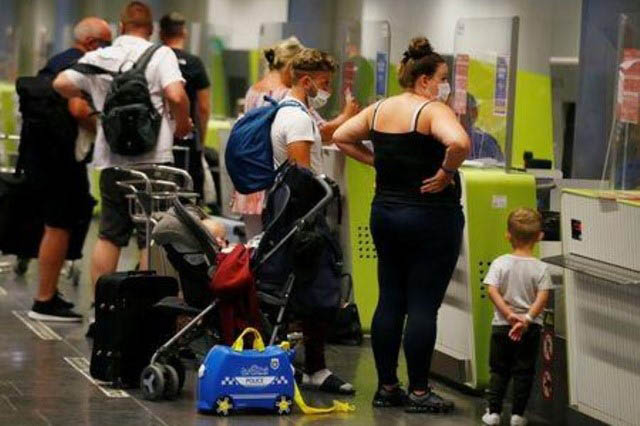SYDNEY/LONDON, (Reuters) – Nations in Asia imposed new restrictions yesterday, while an abrupt British quarantine on travellers from Spain threw Europe’s summer reopening into disarray, as the world confronted the prospect of a second wave of COVID-19 infections.
In the United States, still dealing with its first wave as infection rates have climbed since June, President Donald Trump’s national security adviser, Robert O’Brien, became the most senior official to test positive. The White House said Trump had not interacted with him in days and was not at risk.
Surges were reported in several countries that previously appeared to have the virus under control.
Australia recorded a record daily rise. Vietnam was forcing tens of thousands of tourists to evacuate the central city of Danang. Mainland China, where the virus first emerged late last year, confirmed the most locally transmitted cases since early March.
Hong Kong banned gatherings of more than two people, closed restaurant dining and made face masks mandatory in public.
A surge of new infections in Spain, another early epicentre of the pandemic, prompted Britain on Saturday to order all travellers from there to quarantine for two weeks, undoing months of preparation for Europe’s reopening to tourism.
On Monday, the Foreign Office dealt Madrid a new blow by extending its advice against non-essential travel to mainland Spain to include the Balearic and Canary Islands.
The World Health Organization (WHO) said travel restrictions were not a long-term answer. It said proven strategies such as social distancing and face covering must be employed to halt the virus spread.
“It is going to be almost impossible for individual countries to keep their borders shut for the foreseeable future. Economies have to open up, people have to work, trade has to resume,” WHO emergencies programme director Mike Ryan said.
Officials in some European and Asian countries where the virus is spreading again said new outbreaks could be contained with local measures rather than nationwide shutdowns.
Britain’s quarantine was an “error,” Spanish Prime Minister Pedro Sanchez said on Monday.
The rebound in infections is focused in two regions, he said, adding: “In most of Spain, the incidence (of the disease) is very much inferior to even the numbers registered in the United Kingdom.”
Spain’s hotels on Monday offered to pay for foreign tourists to take coronavirus tests. Last year, Britons made up over a fifth of foreign visitors to Spain, which relies heavily on tourism.
Airlines and travel businesses that managed to survive the first wave now worry that an aborted reopening could be fatal.
Europe’s biggest airline, Ryanair, cut its annual passenger target by a quarter on Monday and warned a second wave of COVID-19 infections could lower that further.
Europe has yet to lift bans on travellers from several countries, including the United States, where premature reopenings have led to record numbers of infections and deaths in many states.
BASEBALL IN JEOPARDY
A pandemic-shortened North American baseball season, launched last week in empty stadiums, suddenly appeared in jeopardy after 12 players and two coaches on the Miami Marlins tested positive while on the road in Philadelphia. Monday’s games were postponed in both cities.
Nearly 200 federal healthcare workers have been deployed to California’s Central Valley agricultural breadbasket, where hospitals are overwhelmed with COVID-19 cases as new infections soar, Governor Gavin Newsom said.
Florida in particular has been hard hit this month, with 10,000 new cases a day becoming the norm across the state. Hospitals have called in extra staff as workers become sick.
“In 10 years of medicine, I never had to put another nurse on life support. I never had to worry about my co-workers dying,” said Kevin Cho Tipton, a critical-care nurse practitioner who works at one of Miami’s largest public hospitals. “It’s been emotionally very challenging, physically very challenging.”
U.S. Senate Republicans on Monday proposed a coronavirus aid package hammered out with the White House, paving the way for negotiations with Democrats before expanded unemployment benefits for millions expire this week. The plan sparked immediate opposition from both Democrats and Republicans.
Nearly 150,000 people have died of COVID-19 in the United States out of more than 4.2 million confirmed cases.
In China, which managed to squelch local transmission through firm lockdowns after the virus first emerged in the central city of Wuhan, a new surge has been driven by infections in the far-western region of Xinjiang.
Australian authorities, who have imposed a six-week lockdown in parts of the southeastern state of Victoria, said it could last longer after the country reported its highest daily increase in infections.
In Japan, the government said it would urge business leaders to ramp up anti-virus measures such as staggered shifts, and aimed to see telecommuting rates return to levels achieved during an earlier state of emergency.
Vietnam was evacuating 80,000 people, mostly local Vietnamese, from the tourism hot spot of Danang after three residents tested positive at the weekend. Until Saturday, Vietnam had reported no community infections since April.

